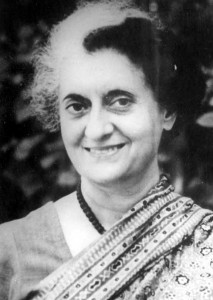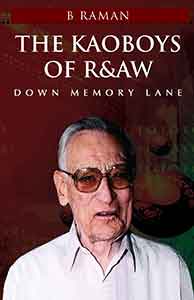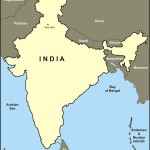Till 1985, the IB was the over-all in charge of the security of the Prime Minister — while he or she was in Delhi as well as during his or her travels in India and abroad. The IB’s duties,inter alia, included updating from time to time the Blue Book instructions relating to the security of the Prime Minister, issuing circular instructions on the subject, assessing threats to the security of the Prime Minister, co-ordinating physical security for the Prime Minister at Delhi through the Delhi Police, co-ordinating security arrangements for the Prime Minister during his or her travels in liaison with the concerned State agencies and foreign security agencies etc.
While the IB co-ordinated and supervised the security, the actual security-related tasks, including those of bodyguards, were performed by the staff of the police concerned. India did not have a dedicated physical security agency for the Prime Minister like the US Secret Service.
Till 1975,the Division in the IB responsible for the Prime Minister’s security had a very small set-up with just three officers — a Joint Director at the head, who was of the rank of an Inspector-General of Police (IGP), a Deputy Director, who was of the rank of a Deputy Inspector-General of Police (DIG) and an Assistant Director, of the rank of a Superintendent of Police (SP). This expanded after 1975 partly due to perceived threats to Indira Gandhi during the Emergency and partly due to the Anand Marg, a Hindu spiritual group with an international following, indulging in acts of violence in order to protest against the detention of its leader by the Indian authorities.
…brief the local authorities on the likely threats to the Prime Ministers security and on the security arrangements that would be required.
Its acts of violence, which amounted to terrorism, were not confined to India. Its followers abroad in Australia and West Europe indulged in violence too. The Ananda Marg had, therefore, been included in the list of organizations capable of posing a threat to the security of the Prime Minister.
Posting in this Division was highly coveted by officers of the Indian Police Service — in the IB as well as in the States. It gave them a status symbol and provided many opportunities for travel — in India as well as abroad. The opportunities for frequent foreign travel — ahead of the Prime Minister and along with him or her — was a very strong attraction for the officers.
Before 1975, whenever the Prime Minister intended visiting a foreign country, the Deputy or Assistant Director of this Division would visit that country in advance on what used to be described as Advance Security Liaison Visit to discuss the Prime Minister’s programme with the local authorities, inspect the place of stay and other places to be visited by the Prime Minister, brief the local authorities on the likely threats to the Prime Minister’s security and on the security arrangements that would be required. This officer would then come back to Delhi and go along with the Joint Director, who would accompany the Prime Minister, and a small number of Delhi Police officers, who would actually perform the physical security duties as bodyguards etc.
When the R&AW was created in 1968, Kao set up a VIP Security Division in the R&AW too to collect intelligence on likely threats to the Prime Minister from foreign-based elements. From 1975 onwards, at Kao’s instance, one of the officers of this Division started accompanying the IB officer going on advance Security Liaison. Later, the MEA insisted that one of their officers should also accompany the IB officer to discuss protocol arrangements with the local authorities.
There was a craze among police officers for being associated with the security teams going abroad with the Prime Minister since it gave them an opportunity for shopping and bringing back electronic and other goods without paying duty on them.
In addition to the Advance Security Liaison Visit, R&AW officers started going with the Prime Minister too as part of the IB’s security team in order to ensure communications security and provide inputs regarding likely threats from elements in the country being visited by the Prime Minister. Whenever Sonia Gandhi and her children traveled with the Prime Minister, specially-selected women police officers from the Delhi Police would be included in the security team accompanying the Prime Minister. The mushroom growth in the strength of the IB’s VIP Security Division and in the composition of the security teams going ahead of the Prime Minister or along with him or her led to a dilution in the quality of supervision and co-ordination.
There was a craze among police officers for being associated with the security teams going abroad with the Prime Minister since it gave them an opportunity for shopping and bringing back electronic and other goods without paying duty on them.
Smuggling-in of foreign goods by the staff associated with security duties almost became a racket. As soon as the Prime Minister’s plane taxied to a halt, the Prime Minister and his or her entourage would leave in their cars. A vehicle of the IB and another of the Delhi Police would then go to the tarmac. The electronic and other goods bought abroad by the security personnel would be loaded into them. They would drive out of the airport without these goods being declared to the Customs. The officers would then exit in the normal manner through the Immigration and the Customs, with the bags which they had carried with them while going abroad. The Customs knew that this was happening, but did not take notice of it.
In September 1983, Indira Gandhi had been to New York to attend a session of the UN General Assembly. The Door Darshan had introduced the previous year the colour TV in connection with the Asian Games. There was a craze for foreign-made colour TV sets in all sections of our society.Many, who went abroad, came back with colour TV sets. About 15 Police officers of various ranks had accompanied her to New York. Three of them were from the R&AW and the rest belonged to the IB and the Delhi Police. During their stay in New York, all of them except one senior officer of the R&AW, bought colour TV sets and other electronic equipment. Some bought more than one colour TV set for being given to their relatives.
During the return journey from New York, there was a slight delay in the aircraft starting. Its doors were still open even after Indira Gandhi had got in and taken her seat. As she looked out through the window, she saw a large number of cardboard boxes containing TV sets and other electronic equipment being loaded into the luggage hold. She asked a member of her entourage to whom they belonged. He replied that they belonged to her security team. She did not say anything.
As she (Mrs Indira Gandhi) looked out through the window, she saw a large number of cardboard boxes containing TV sets and other electronic equipment being loaded into the luggage hold. She asked a member of her entourage to whom they belonged. He replied that they belonged to her security team.
As the plane was about to land at Delhi, she had a message sent to the Customs through the Airport Control Tower that they should check the baggage of all the security officials, who had accompanied her, and make them pay duty. After the aircraft landed, she got out and went home in her car. Two vehicles of the IB and the Delhi Police reached the tarmac and the security officers started loading the items bought by them in New York into them. In the meanwhile, a car containing Customs officers reached there and told them that everything should pass through the Customs. They said that they were acting under the instructions of the Prime Minister.
There was total panic. The officers admitted their ownership of the goods and promised to pay duty later and collect them. Those, who had brought more than one TV set, admitted their ownership of only one of them and claimed that they did not know to whom the others belonged. A senior officer of the IB, who had stayed behind in New York on a holiday, had sent the TV sets bought by him through one of his staff.
This was in violation of the security regulations, which lay down that an aircraft should carry only the baggage of those traveling in it. When he later returned to Delhi, he totally denied that these TV sets belonged to him. The whole thing became an embarrassing scandal and a national daily of Delhi got the details of it from the Customs officers. It published them prominently. Normally, the hotel room and food bills of those accompanying the Prime Minister are settled by the Indian Embassy in the country visited by the Prime Minister. They were, therefore, entitled to only one-third of the normal daily allowance.
This was a small amount and would not have been sufficient to indulge in a shopping spree. The Cabinet Secretary ordered that all these officers should be asked to explain how they got the money for their shopping. Most of them could not give a satisfactory explanation and got themselves tied in knots.
This was a worrisome state of affairs and was a fit case for acting against these officers and moving them out of duties connected with the security of the Prime Minister. Unfortunately, Kao, who was very kind-hearted, did not remove them. He merely expressed his displeasure to them and let them continue. This incident illustrated the kind of permissiveness, which had crept into the VIP security set-up. This permissiveness was one of the factors, which led to a dilution of the quality of supervision.
After the Army operation against Bhindranwale and the Khalistani terrorists in the Golden Temple, it was apprehended in the intelligence community that the Sikhs — even some not associated with the Khalistan movement — would attempt a reprisal attack on her for the damage suffered by the Akal Takht and for the death of Bhindranwale. In assessing the increased threats to her, one had also taken into account the danger of a reprisal attack on her by Sikh security personnel in her own entourage. Steps were initiated for revamping the intelligence collection machinery by increasing the staff in the existing R&AW stations and by setting up new stations. Requests for assistance were made to foreign intelligence agencies. The monitoring capability of the R&AW was strengthened in order to keep a better watch on the communications of the Khalistani organizations. The entire physical security arrangements for her were reviewed in order to eliminate the possibility of a threat from an insider.
…R&AW to intercept a large number of telephonic conversations of Khalistani elements in India and abroad. They were very critical and abusive of Indira Gandhi…
While the stepped-up intelligence collection efforts resulted in a quantitative increase in reports, there was no flow of precise intelligence. There was a flow of a large number of reports of a general nature. The foreign intelligence agencies were not very helpful. Western countries such as the UK, the US and Canada had sizable Sikh population in certain constituencies.
The local political leaders did not want to antagonize them by co-operating with the Government of India against the Khalistanis. An incident involving the West German authorities would illustrate the kind of non-cooperation we faced. Ever since 1981, Talwinder Singh Parmar, a sacked saw mill worker of Vancouver in Canada, who belonged to the Babbar Khalsa, had been making threatening statements against Indira Gandhi. Long before Operation Blue Star, the R&AW was worried that he might try to have Indira Gandhi killed during her foreign travels. He was wanted in India for trial in a case relating to the massacre of some Nirankaris and other cases. We had been repeatedly asking for the assistance of the Western intelligence agencies for having him arrested and brought to India for trial. They did not oblige.
At our request, the International Police Organization (INTERPOL), whose headquarters are in France, had a look-out notice issued to all member-countries, asking them to arrest him if he was found in their territory and inform the Indian Police. In 1983, he traveled by train from Zurich to West Germany. A West German Police Constable noticed that his passport particulars were the same as given in the INTERPOL look-out notice. He arrested him and the West German authorities informed the Central Bureau of Investigation (CBI) through the INTERPOL.
The CBI immediately asked the West German authorities to hand him over to the Indian Police for trial in the cases pending against him. They asked for the details of the cases in which he was wanted and the evidence against him. They were informed that a CBI team would be flying to Bonn with these details and were asked to keep him detained till the CBI team reached there. Just before the departure of the CBI team for Bonn, the MEA received a message from the Indian Consul-General in Vancouver that Talwinder Singh Parmar had addressed a religious congregation in a local gurudwara, during which he made highly threatening statements against Indira Gandhi.
When we took it up with the West German authorities, they claimed that they had to send him back to Vancouver because the court had refused to give any more extention of his detention due to a delay in the arrival of the CBI team. There was no delay at all. On coming to know of his arrest and detention in West Germany, the local sikh community had exercised pressure on the Government there to release him and let him go back to Canada. The West German Government obliged them. Two years later, Parmar played an active role in the conspiracy, which resulted in the blowing-up of a plane of Air India called Kanishka off the Irish coast, which resulted in the death of over 300 passengers, many of them Canadian citizens. The West German authorities cannot escape a major share of responsibility for this colossal tragedy.
The strengthening of the monitoring efforts enabled the R&AW to intercept a large number of telephonic conversations of Khalistani elements in India and abroad. They were very critical and abusive of Indira Gandhi and the Government of India, but the IB and the R&AW did not intercept any conversation, which indicated a specific conspiracy to have her assassinated. It was believed that if the Khalistani elements had discussed any such conspiracy among themselves over the telephone or through the wireless, either the IB or the R&AW would have come to know of it .







Dear Author,
You may be an expert in our own right, but i wish to clarify that Anand marg has never indulged in the acts of terrorism niether in india nor elsewhere. Here it will worth mentioning that Anand marg is one such organisation that is committed to the cause of humanity that it has one of the biggest relief teams which travels thru out the world for natural disasters.
Regards
Malay